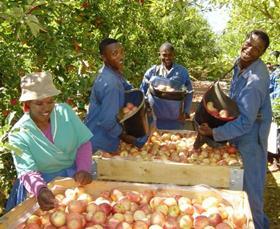
A powerful South African fruit industry and government delegation is heading for India this weekend to try and advance the signing of a preferential trade agreement, which could grant South African apples and pears more favourable access to the country.
The move comes at a time when South African topfruit growers are eagerly awaiting the signing of a protocol with China that has been delayed at government level for some time.
“We are still hoping that we will get access to China this season,” said Nigel Mudge, chairman of the Joint marketing Forum for Apples and Pears.
It is, however, the trip to India that will occupy most attention during the next few weeks. The delegation includes Mr Mudge, National Marketing Council chairperson Ronald Ramabulana, industry leaders Alastair Moodie of the Meltsetter Group, Pieter du Toit of Dutoit Group based at Ceres and Louis Kriel, chief executive of the Capespan Fruit Division. Stuart Symington, chief executive of the Fruit Exporters' Forum, will also accompany the delegation.
Mr Mudge noted that at present there is a 50 per cent duty on South African apples and pears in India, making it very difficult for South African exporters to service their customers.
'The South African government has been working on trade links between South Africa and China for some time and we have now decided to approach the Indian trade and the Indian government through this delegation to try and advance the issue,' said Mr Mudge. 'We are quite happy to discuss particular marketing periods for lower duties when we do not directly compete with the Indian seasonal marketing of their own apples and pears.”
According to Mr Mudge, there are strong links between South Africa and India that favour increased trade between the two countries. 'We share the legacy of Gandhi and in South Africa we have a large Indian community,' he explained. 'Travel between our countries is relatively easy and there is no reason why links in the fresh produce trade can also not be improved.'
The South African delegation will meet importers in Mumbai during the first three days of next week, before moving to Delhi for government discussions.
Mr Mudge acknowledged that South African growers would have to work hard to develop the Indian market once the preferential trade agreement had been signed.
'We need to produce more of the cultivars which are suitable for the Indian market,' he said. 'At present, Golden Delicious and Granny Smith apples represent more than 50 per cent of our crop. We will have to increase plantings of Fuji and Royal Gala to produce more of what Indian consumers require.'



